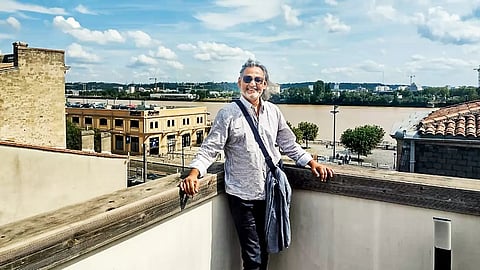Song of the River
Bordeaux Diary: Wine Tasting, Digital Art & Holidaying In Europe
Exploring Nouvelle-Aquitaine, famous for the city of Bordeaux and taking lessons there from a veteran wine taster in Europe
The thought of the prohibitive electricity bills they will have to pay for heating homes this winter due to the energy crisis caused by the Ukraine war could not dampen the French holiday spirit this summer. The picturesque towns, beaches and countryside in France were full during Les Grandes Vacances, the months of July and August, when the only people working overtime were the ones from the hospitality industry.
I too ventured out of Brittany, a region I frequent, to explore another region of the country, Nouvelle-Aquitaine, famous for the city of Bordeaux, known for wine.
All port cities have several layers of history. The sea access made invasions into France sporadic, but it also kept trade and commerce in these cities lucrative, which in turn bankrolled art, culture, and gastronomy affording their citizens a good life.
The enormous River Garonne runs through Bordeaux, dividing the city into east and west, to meet the Atlantic in the southwest. Bordeaux was among the few towns in France that got relatively spared from the WWII blitzkrieg. Buildings in Gothic and Romanesque style magnificently flank the river on either side.
Nazi Bunker Home to Art
Bordeaux is also home to the world’s strongest submarine bunker the Nazis built after they occupied the city in 1940, which the Allied bombing could not destroy. The bunker now houses Bassins des Lumieres, the world’s largest gallery of digital art. An immersive exhibition, Venice, created by Culturespaces Digital, a collective of digital artists, will run there until February 2023. The exposition invites the visitor to a 40-minute walk through the city of Venice, to discover its artistic and architectural grandeur through the visible symbols of an exceptional past, between interiors and exteriors as well as between the sacred and the profane.

Digital art is one of the most exciting art forms of our times. Contemporary digital artists reinterpret masterworks of a different vintage, giving the flâneur an experience that is enormous in scale compared to the original artwork. Often, the added dimensions of sound and motion to the new creation enrich the experience. Watching their reinterpretations of classical art forms is sheer joy.
In the Wine Country
I am taking a lesson in wine tasting from Monsieur Jean-Pascal Paubert, a veteran wine taster in Europe, tasting and grading wines for over 40 years. Paubert teaches wine tasting at Bordeaux’s Vatel School of Hotel Management and Tourism. He can tell the age and the grape of the wine by taking a sip blindfolded.
Colour, smell and taste, in that order, he reveals the secret, speak of the vintage and the quality of the wine. Follow these steps when the next time you pour yourself a glass of wine: first, pour just a little wine into the glass, tilt the glass and then straighten it for the wine to slide down the rim. If the colour is deep violet the wine is old; for Blanche, the more colourless the liquid the older the wine. Next, bring the glass close to your nose and inhale deeply into the glass; a fruity smell means the wine is young, while a woody smell of the cask means the liquid has stayed in there for a longer time. Now make the liquid swirl in your glass letting it breathe. Smell again, the aroma you notice has changed now. Let the wine remain on your palate a little longer to feel the taste.
In recent few years, France has become a much sought-after destination for Indian students, as studying there is relatively cheaper than in other western countries. Even during Covid last year, more than 10,000 students enrolled in French universities, which now allow foreign students to stay for two years after completing graduation. Paubert hails for me Harikrishna, one of his students from the temple town of Madurai, Tamil Nadu. Hari’s family runs a restaurant business there. He is at the Vatel School to specialise in beverage management and thinks social drinking in India is becoming a commonplace practice. The money a table in his restaurant can make in corkage from a wine bottle is far more lucrative than the food bill of a guest. “Business in wine will be good in India in coming years,” proffers Hari cockily.
“Tous mes vœux,” I say.
(This appeared in the print edition as "Bordeauz Diary")
Bishwadeep Moitra is the co-founder of Silaiwali, a social enterprise
Tags